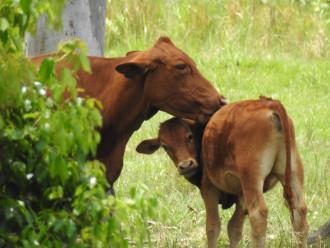By Aryeh Ronay – In chapter 18 in the Biblical book of Genesis, Abraham is sitting at the entrance to his tent during the “heat of the day.” He is visited by three angels whom he invites to “come to your servant,” i.e. himself, and he rushes to serve them. Abraham “hurried into the tent” to ask his wife, Sarah, to prepare food for these distinguished guests, and he serves them a lavish meal of milk and meat. After this scrumptious meal, they tell him the good news that they’ll return in a year and “Sarah your wife shall have a son.”
Sarah, who was “listening at the tent door behind him” laughs at this suggestion, as Abraham and Sarah are both over a 100 years old. In response “The LORD said to Abraham, ‘Why did Sarah laugh?'” Sarah denies laughing because she’s afraid, but God insists on the truth: that she did indeed laugh. For this reason they name their son Isaac, meaning, “he will laugh.”
The angels set out from the tent toward Sodom and “Abraham walks with them to see them off.” Yet, as the angels are leaving, God reveals that the angels are going to “wipe out Sodom and Gomorrah.”
The angels continue on their way toward Sodom, but Abraham is disturbed by this and asks if God will really “sweep away the righteous with the wicked.”
In one of the boldest acts in human history, Abraham attempts to negotiate with God, asking Him if there are “50 righteous within the city,” will God still destroy it? The Lord said in response that if He finds 50 righteous people in the city, he will spare it.
Abraham speaks with the utmost humility and chutzpa, asking that since he’s already been “so bold to speak to the Lord, though I am but dust and ashes,” can he lower the number of righteous people for whose sake God would not destroy Sodom and Gomorrah? Abraham continues to ask for a lower and lower minimum number of righteous people, until he reaches 10, and then God leaves.
Eco Bible
The Resilience of Trees in Genesis 18
Genesis 18:4 – Let a Little Water Be Brought; Bathe Your Feet and Recline Under the Tree.
Rabbeinu Chananel asked why the angels revealed themselves to Abraham under a tree. He answered that in doing so they revealed a message to Abraham: “You, like a tree, will flourish even in your old age,” as it says in the book of Job, “For a tree has hope; if it is cut it will again renew itself, and its trunk will never cease (Job 14:7),” and in the words of the Psalmist, “He shall be as a tree planted beside streams of water, which brings forth its fruit in its season. Its leaves do not wilt; and whatever it does prospers (Psalms 1:3).”
Abraham’s resilience and prosperity are compared to a tree. Indeed, trees are one of the most resilient organisms, specifically against drought. This is increasingly important in light of climate change causing unpredictable rainfall, extreme weather events, and stronger pests that threaten forests.1 Contemporary researchers have discovered that diverse “forests with trees that employ a high diversity of traits related to water use suffer less of an impact from drought.”2 They are also more resilient to forest fires.
Comparing Veal in Genesis to Today
Genesis 18:7 – Then Abraham Ran to the Herd, Took a Calf, Tender and Choice, and Gave It to a Servant-Boy, Who Hastened to Prepare It.
Radak (Rabbi David Kimchi, 1160–1235) explains that the calf was “fatty.” A Biblical fatty calf would have been naturally well fed by its mother and not overworked, so that it could put on weight. Today, however, calves are raised unnaturally for veal, kept in cramped conditions, and fed artificial fluids.
Regarding the permissibility of this modern way of raising calves, Rabbi Moshe Feinstein, one of the greatest twentieth-century authorities on Jewish law, writes, “Regarding the new method of fattening calves in special, narrow stalls where they don’t even have enough room to take a few steps, and they are not fed any normal animal feed nor are they allowed to suckle at all but instead are fed with fatty liquids from which they derive no pleasure at all and they are also frequently ill because of this and require all kinds of medication: Those who perform this (the fattening) are surely guilty of the prohibition of causing pain to animals. For even though it (pain) is permitted when there is a purpose, for example to slaughter them for food or to use them for plowing or transport, etc. but not for senseless pain, which is forbidden even if someone makes monetary gain from it . . . In any case, it is forbidden to cause pain to an animal, to feed it food which it doesn’t enjoy, which causes pain, or which causes it to be ill.”3
Comparing Climate Change to Genesis 18
Just like Abraham was concerned about God destroying “the innocent along with the guilty,” climate change also threatens to “sweep away the innocent along with the guilty.” Moreover, the wealthy developed countries that are guilty of producing the most greenhouse gasses are in fact the least vulnerable to climate change as compared to the less developed countries who contribute the least greenhouse gasses.
In a recent joint appeal from Pope Francis and other religious leaders, the following call was made: “Wealthier countries must take the lead in reducing their own emissions and in financing poorer nations’ emission reductions”.
Climate change affects all of us, but especially countries that are impoverished and highly dependent on their local land. Following the example of Abraham, we can call for justice, and ensure that the innocent are not harmed by the greed of the guilty.
Closing Thoughts on Genesis 18
Genesis 18 inspires us with an incredible story of Abraham’s hospitality for angels and his audacity in arguing with God. Furthermore, by reflecting on this story from an ecological lens, we have gained many insights into how our world has changed from the time of the Bible, how our world has stayed the same and how we need to find inspiration in the Bible to make our world even better.
It is not easy to change the world, but looking at Abraham and Sarah, we see that from one amazing couple, there are now over four billion people who consider him their spiritual patriarch.
Abraham was called “Abraham the Hebrew” in the Bible. According to Jewish tradition, this is because the word “Hebrew,” aka “Ivri,” means “the one who stands on the other side.” The whole world stood on one side, but Abraham stood firm on the other. As we fight for the sake of our planet, we can be inspired by Abraham to never let ourselves be overwhelmed by the odds against us. With the help of God, we can persevere.
Sources
1. Moises Velasquez-Manoff, “Can Humans Help Trees Outrun Climate Change?” The New York Times, April 25, 2019, https://www.nytimes.com/2019/04/25/climate/trees-climate-change.html?searchResultPosition=7.
2. William R. L. Anderegg et al., “Hydraulic Diversity of Forests Regulates Ecosystem Resilience during Drought,” Nature 561, no. 7724, September 2018, https://doi.org/10.1038/s41586-018-0539-7.
3. Responsa Igrot Moshe, Even Ha’Ezer, vol. iv 92. Quoted in “The Environment in Jewish Thought and Law,” Saul Stokar, Sviva Israel (2018), 28.
* Featured image source






